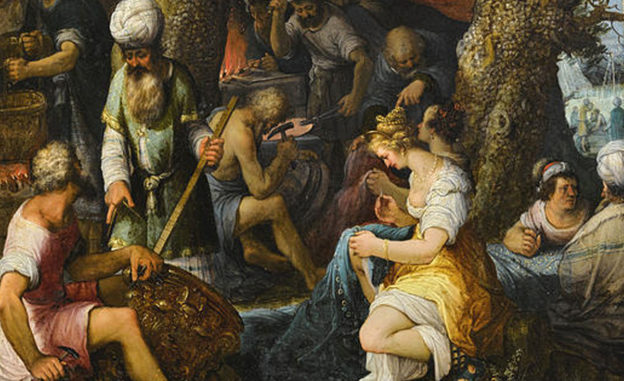The Tabernacle was no ordinary shack; it was God’s dwelling place with his People. At that place, a sinful person could come into the presence of their holy God and have fellowship through the sacrifices offered on their behalf. No surprises then that the finest artisans were set apart for its work, and the Israelites were lavish in their gifts towards its construction!
In this passage we see Moses commissioning Oholiab and Bezalel to commence the construction task. We see God’s anointing and their commissioning for their role, and the generous freewill giving of the Israelites towards the extension of God’s salvation plan. This points us to the relationship we have with God in Christ, who empowers us with gifts by the Holy Spirit and gives us a spirit of generosity towards the Kingdom Work.
In Chapter 31, God told Moses that he had set aside Oholiab and Bezalel to lead the construction efforts for his dwelling place. Now, as the various construction materials arrived on site (no global logistic delays), Moses announces them as the successful appointees for the construction contract (vv.30, 34).
Of particular note, Moses states that Bezalel was filled “with the Spirit of God” to complete the various tasks he would need (v.31). The tabernacle was a special building, and required special empowerment to be made right. Plenty of Israelites had crafts and skills necessary for the effort, but Bezalel was particularly inspired and anointed to his role to lead the construction effort (vv.32-3).
In addition, both Bezalel and Oholiab were gifted with the ability to teach others what they devised, and what they knew of their crafts, for God’s glory (vv.34-5). This would be necessary, because repairs and maintenance would be necessary to keep the tabernacle looking fit for a king. Those repairs would continue long after Bezalel and Oholiab would enter God’s eternal presence.
But Bezalel, Oholiab, and those under their charge were not let loose to come up with whatever design took their fancy. “Bezalel and Oholiab and every craftsman in whom the LORD has put skill and intelligence to know how to do any work in the construction of the sanctuary shall work in accordance with all that the Lord has commanded” (36:1). Their commissioning came with a firm set of design principles (the Law) and detailed outlines. What they built not only had to meet God’s standards, but communicate the pictures God intended about his salvation plan.
After announcing the commissioning of Bezalel and Oholiab, Moses “called Bezalel and Oholiab and every craftsman in whose mind the Lord had put skill, everyone whose heart stirred him up to come to do the work” (v.2). What is clear here is that they were both skilled, but willed to answer the call. The labourers wanted to work on the tabernacle.
Those labourers set to work on construction, but the contributions kept on coming (vv.3-5). The Israelites were so devoted to the building project, and God’s presence in their midst, that they kept on offering resources for building the tabernacle of their own freewill. For those who were not skilled in crafts and construction skills, it was one way they could contribute.
Since there was more than enough for the task at hand, Moses issued a proclamation to stop God’s People from contributing more to the building project, “for the material they had was sufficient to do all the work, and more” (vv.6-7). It was only this command which stopped them from their generous gifting out of their excitement.
There are a number of ways in which the passage has parallels for us today. As labourers in God’s Kingdom, we too enjoy giftings inspired by the Holy Spirit. All of us have unique talents and abilities, yes, but we also have the Gifts of the Spirit which are given to build up the Body of Christ on Earth. When we exercise our gifts, we are used by God to build his Kingdom, the Temple of the Holy Spirit not made by hands.
Since gifts are for the benefit of others, we too have roles to play in teaching others how to use their own gifts to build up the Church. Every part of the Body plays an important role, and learning (and passing on) the proper use of our gifts for God’s glory helps ensure the proper functioning of the Church.
Since we are each gifted different abilities and Spiritual Gifts, we should also learn from Israel’s example and do what we are called to do. Not everyone was a metalworker. That was okay. Not many are called to ministry; that’s okay too. We should not try to do what we are not gifted and called to do, but what God has laid on our hearts.
And whether it is in giving resources or giving of our abilities, the Gospel should excite us to generous gifting. God generously gifted us salvation through Jesus, fellowship with him, spiritual gifts, and an eternal home. Reflecting on God’s generosity helps change us to reflect that generosity back to God.

